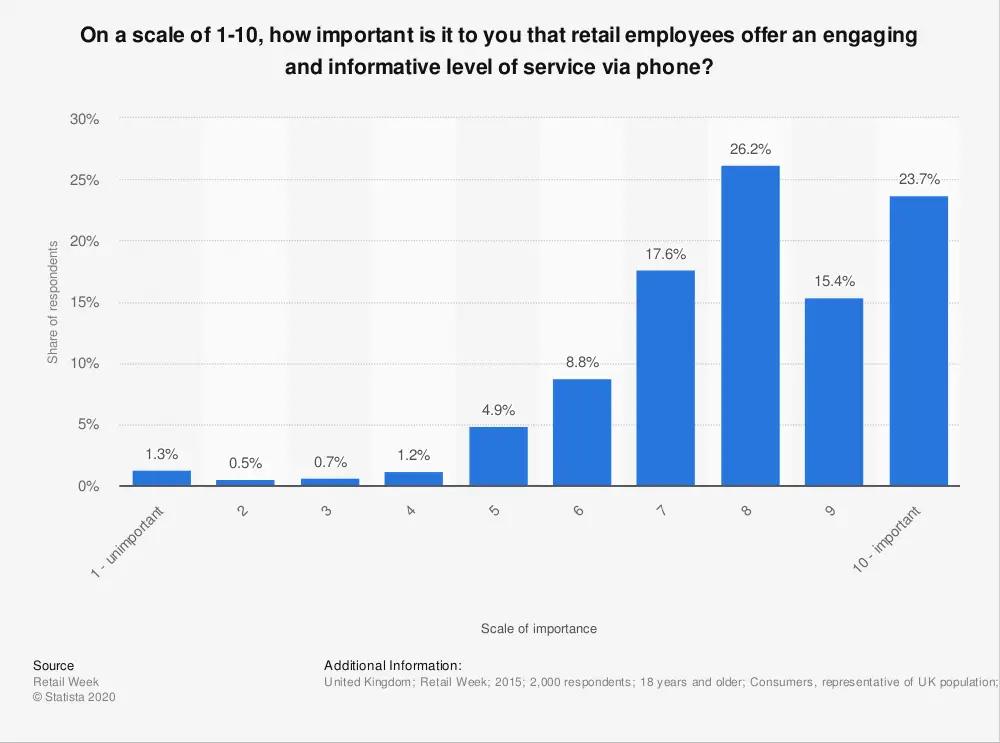We know that there are many different types of sales positions in the world. When you think about it, marketing and telesales are often talked about as being very similar, and however, they have some key differences worth exploring. Let’s explore what those differences are!
The goal of a customer service representative is to resolve any issue or concern a customer has with their product or service in the most efficient manner possible.
The goal of a telesales agent is to acquire new customers for their company by making phone calls and setting up appointments for potential clients who may be interested in purchasing goods or services from them.
Telesales agents call businesses, while customer service representatives typically deal with consumers phoning in to the company to reach someone on staff regarding an issue.
Telesales seeks to sell products or services. Customer service is generally a cost-benefit analysis that tries to find an outcome where the customer doesn’t feel ripped off.
Besides the fact that telesales salespeople are typically on commission and customer service reps are usually not, telesales folks are also more likely to be selling something with higher monthly fees. In contrast, customer service falls under more case-by-case interactions.
The extra caveat? Telesales calls often happen at an incredibly high frequency, sometimes even hundreds of times per day! For the number of stressors involved in a job like this, it’s no wonder phone jackpots can run up into four digits pretty quickly.
What Is The Difference Between A Contact Center And A Call Center?
A contact center allows customers to get in touch with businesses for service, support, or questions. It’s often used as an umbrella term for organizations that provide customer service over the phone or email.
A call center is typically a business whose primary function is taking calls from customers and providing them with information. A call center will usually offer its services 24 hours per day and may operate around the clock.
Many people use these terms interchangeably, but they are not quite synonyms. While both involve communication between companies and consumers, only a contact center offers assistance without making an appointment first. Contact centers also tend to be more specialized than call centers.
In most instances, contact centers spend more time focusing on a specific topic or market segment than Phone Call Centers can. Moreover, Contact Centers specialize in newer technologies, while Phone Call Centers have been around for much longer. Their employees might be less knowledgeable about more cutting-edge methods of serving business customers.

Looking For Targeted Leads?
Find accurate B2B contact information for targeted marketing. Close more deals and start more conversations.
Why Is The Contact Centre So Important?
What is the Contact Centre? The contact center, or customer service department, can be found in organizations of all sizes and shapes. Contact centers provide the first point of contact with customers 24 hours each day, night, and weekend.
They also provide outsourced work to employees who may not be on-site during business hours. This function is an integral part of any company’s success because it directly accesses what matters most: the customer!
Contact centers are a critical part of any customer service strategy, and the different facets can help your company differentiate from customers.
Contact center agents typically engage in live conversations on calls, as well as handling emails and chats.

Offshore contact center providers have the advantage of being able to handle queries that require strong language skills, international expertise, or long-winded solutions involving many steps.
A contact center manages customer relationships and interactions with customers by gathering information, resolving issues, executing new promotions, and earning new business.
They’re a bridge between your company and your customers, enabling all the communication that you need to keep up with their needs.
A contact center is used for handling interactive voice response (IVR) telephone calls within modern call centers and contact made using email or other mediums such as Facebook messages or chat apps like Whatsapp.
It’s also how people use online help applications to get in touch with companies about technical problems. The general workflow of a typical software-based service desk starts when an agent logs in to the service desk management system to monitor incoming work.
What Is More Important Sales Or Customer Service?
A question that has been asked many times is which is more critical sales or customer service. One school of thought says that sales are the most important because they generate revenue, and without payment, there would be no business to provide excellent customer service.
The other side says that providing excellent customer service will make customers loyal. Hence, they buy from you again and again, which means even if it takes a few dollars in losses, you’ll get back 100% of your investment tenfold in return.
Who’s right? It depends on what kind of company you’re trying to build: high-priced goods with low margins or a lower price point with higher margins (more transactions).
The truth is both sides have value for different kinds of companies.
Customer service is a significant component of the customer experience, and you must have a strategy in place to create, deliver, and manage your customer’s experience.
However, while many organizations put their efforts into building and maintaining that customer relationship with excellent service, some ignore this as an area of focus.
For example, just last year, Walmart ranked dead last for any positive interactions with customers. This can be devastating for both sales and the bottom line because if customers aren’t happy, they will take their money elsewhere! What do you think? Is it more actual sales or customer service?
What Is The Difference Between Account Management And Customer Success?
Account management and customer success are two roles that ensure customers are happy with their product. Account managers focus on the day-to-day aspect of a customer relationship, while customer success focuses on providing the product that meets each user’s needs.
Account management is a subset of customer success, and it’s about managing the relationships with key customers, such as deals or critical accounts.
As you know, account managers are good at networking and relationship-building. By understanding their clients’ needs in-depth, they can help consult the company on how to take care of the best.
Account managers also need to be great listeners (partly why I believe they find dealing with customers so satisfying!).
They must respond promptly and cordially to any issue addressed by their customer to maintain their loyalty and potentially have a competitive edge over their competitors. Account managers ensure that every process between client companies runs smoothly for better business outcomes all around.
How Is Customer Success Different From Customer Service?
Do you know the difference between customer success and customer service? Customer success is all about helping customers achieve their goals, whereas customer service focuses on solving problems. The two roles are often combined in an organization, but they have different objectives.
Customer service is reactive; it’s only responding to tickets and complaints. Customer success is proactive, getting in at the start of something before any problems happen and then providing guidance and support.
Success Management provides front-line customer contact for critical accounts by monitoring account performance; Engages key account contacts for early interventions with account issues before they escalate into problems; Monitors key account revenue opportunities; Establishes formal communication practices with P&L contacts.
The ultimate goal of a customer success team is through the identification of trends or patterns the company can empower its customers not to need continuous “hand-holding” in the future.
What’s The Difference Between Customer Service And Customer Support?
It’s not uncommon for businesses to get these two terms confused. Let’s break it down – customer service is a company’s attitude and how they treat their customers. Customer support is the team that handles issues with your products, like problems with shipping or billing.
Customer service aims to make sure you’re happy so you’ll come back again and refer friends; the purpose of customer support is to fix any problems as quickly as possible so you won’t be mad and stop using the product altogether.
Customer service is the company’s department responsible for marketing to, interacting with, and maintaining relationships with customers. They are focused on customer satisfaction.
Customer support is when an agent from the company directly assists customers by providing information about products and services or troubleshooting technical issues.
What Makes A Successful Customer Success Manager?
One of the essential qualities that make up a successful CSM is empathy. Empathy is one of the fundamental traits of good leadership skills, and it’s also about understanding how your customers feel to provide them with solutions that work best for them.
The following essential quality is identifying problems and not just symptoms, which are two very different things. A problem can be solved while a sign cannot.
Once you’ve identified their problems, it’s time to come up with solutions or suggestions that will help solve those specific issues they’re struggling with so they can continue using your product without any hiccups!
Successful customer success managers are built in part on the individual strengths of the CSM themselves and their ability to organize and automate systems.
Good communication skills, excellent organization, and delegation abilities mixed with a healthy obsessive streak for detail will help tremendously during this process.
It is not enough for CSM’s to be just good at understanding software; they also need to have an excellent understanding of customer needs! You must be able to speak with customers on both design and technical topics.
Lastly, there needs to be a balance between having patience and thinking quickly when action is required. This goes for all aspects of your work life, from collaborating on projects with other members in your company who are working on the same task.
How Many Accounts Should A Customer Success Manager Have?
The customer success manager needs to devote time and effort to achieving the organization’s goals. They need to track how many accounts they have so that they can divide their actions accordingly.
A CSM has three active accounts and four inactive ones; this person should focus on the active ones. A good rule of thumb is that you shouldn’t have more than 10-15 active accounts at any given time because it will take too much of your time away from other tasks like outreach or upselling.
How many accounts should a customer success manager have? This question often arises when there are not enough hours in the day for the CSM to service all of their customers adequately.
The customer success manager is essentially a strategic consultant based on one company’s perspective, collaboration, and expertise in informing other departments like sales.
Having this experience from a different point of view allows valuable cross-department insight that can increase efficiency.
For account #1, you receive and provide feedback about the company’s product to them.
For account #2, you help find new customers when they are not doing so well in finding new clients themselves or developing existing ones.
Account #3 could be used to follow up with people who need a second opinion before making large software purchases or just potential prospects to keep an eye on without interfering too much.
Who Does A Customer Success Manager Report To?
A customer success manager is a vital part of any business that wants to grow. If you’re not sure what they do, read on!
Some companies have a dedicated person in charge of managing customer relationships and ensuring customers are satisfied with their product or service experience. This role typically reports to either an executive manager or VP of Customer Success (sometimes both).
The Senior Vice President for Customer Success at Spotify, for example, reports directly to CEO Daniel Ek.
CSMs are responsible for innovating business methods, educating customers on how best to work with your company’s products or services, managing the implementation chargeback process, engaging in ongoing partnership discussions with partner companies, just about anything related to ensuring customer satisfaction.
The VP of Product should already know all this stuff about your product and how it is set up internally to meet its objectives well enough to figure out what they want their CSM team doing every day. What is more important than setting clear objectives is letting your CSM know you’re committed when you hire them by agreeing on quarterly goals and agreeing that there.
Conclusion
A contact center is a critical aspect of any company’s customer service strategy. Contact centers handle the volume and complexity that will make it impossible for in-house staff to manage independently. If you want your customers to have an enjoyable experience, consider hiring a good contact center team with knowledge of human psychology and what people need when they call about your product or services. What do you think? Do you believe sales or customer service is more important?
Glossary
Customer care executive is people who help resolve customer complaints. They have a customer-focused mindset and can find creative ways to solve problems for customers. To become successful in this position, an employee will need to develop strong organizational skills and computer proficiency and maintain a professional demeanor during telephone conversations.
A telemarketing representative or telesales representative is someone who works from a telemarketing company or for themselves selling products or services to the potential customer over outbound calls and occasionally inbound calls. They can be employed by a telemarketing services company, work on commission, and receive an hourly wage. A telesales team may solely perform a telemarketing campaign for prospective customers.
Outbound telemarketing or outbound telesales is a telemarketing activity process of driving calls forward. The goal is to make or take a phone call and turn that into an appointment, sale, create brand awareness, initiate the client buying cycle, or any other set end goal.
A telesales campaign is the most viable way for a salesperson to sell a company’s product using sales calls in the given time frame. This time-bound marketing technique for a salesperson is also essential in boosting individual income. Campaigns can be customer data targeted at the existing customer, specific regions, demographics, accounts or situations, sales pitches catering to customer taste and preference.
Direct marketing is a form of advertising which offers products or services to individuals who are accessible and on the go via private messages or social media platforms. Typically, these customers have given the sales rep access to their personal contact information (e.g., email inbox). This type of marketing usually sends advertisements through letters, emails, faxes, and telephone calls via telemarketing calls that were relatively unheard of just a decade ago. These ads range from cold calling to news articles that would increase lead generation. Customers receive notifications about new arrivals before they even show up on stores shelves!
The business process is the system of activities that an organization carries out to accomplish its specific objective. The goal of which is generally for profits and growth. This view encompasses processes like marketing, sales, and accounting, supporting the fundamental movements towards revenue acquisition or internal efficiency.
Salespeople in many companies are now divided into two camps. “”inside sales””and “”outside sales.””The inside salesperson works out of the building for a company, a telemarketer sales representative. Usually, working with contact center software or companies outsourcing the agents. The outside salesperson travels to businesses and potential customers, demonstrating their products or services face-to-face.


